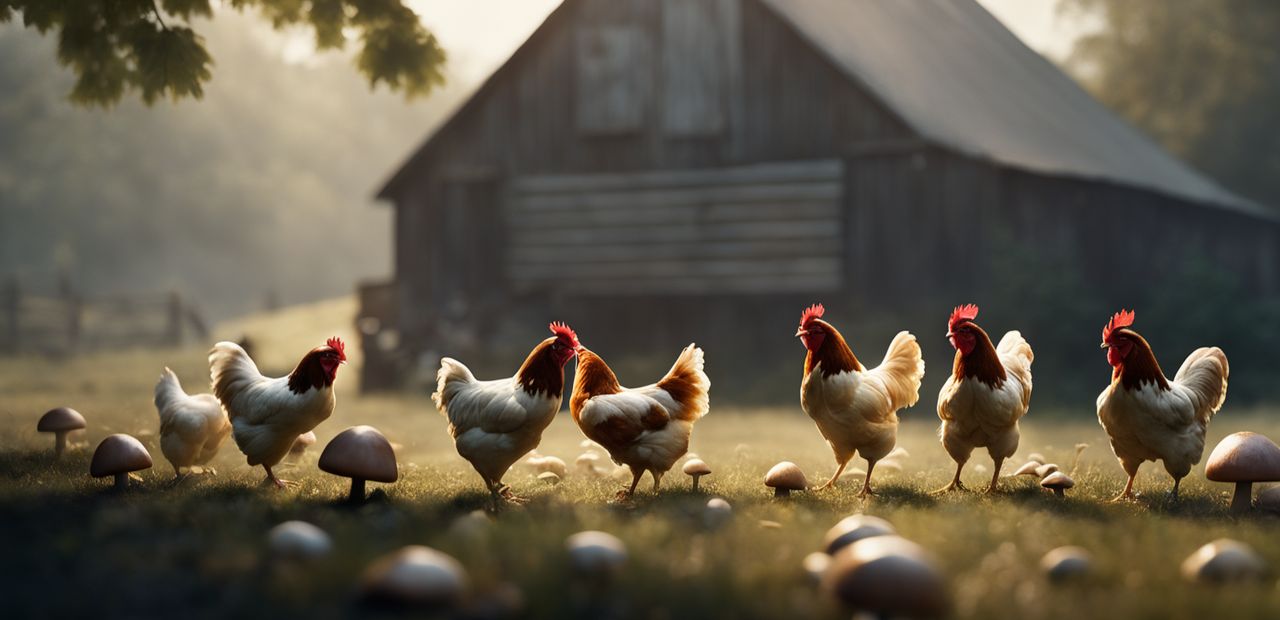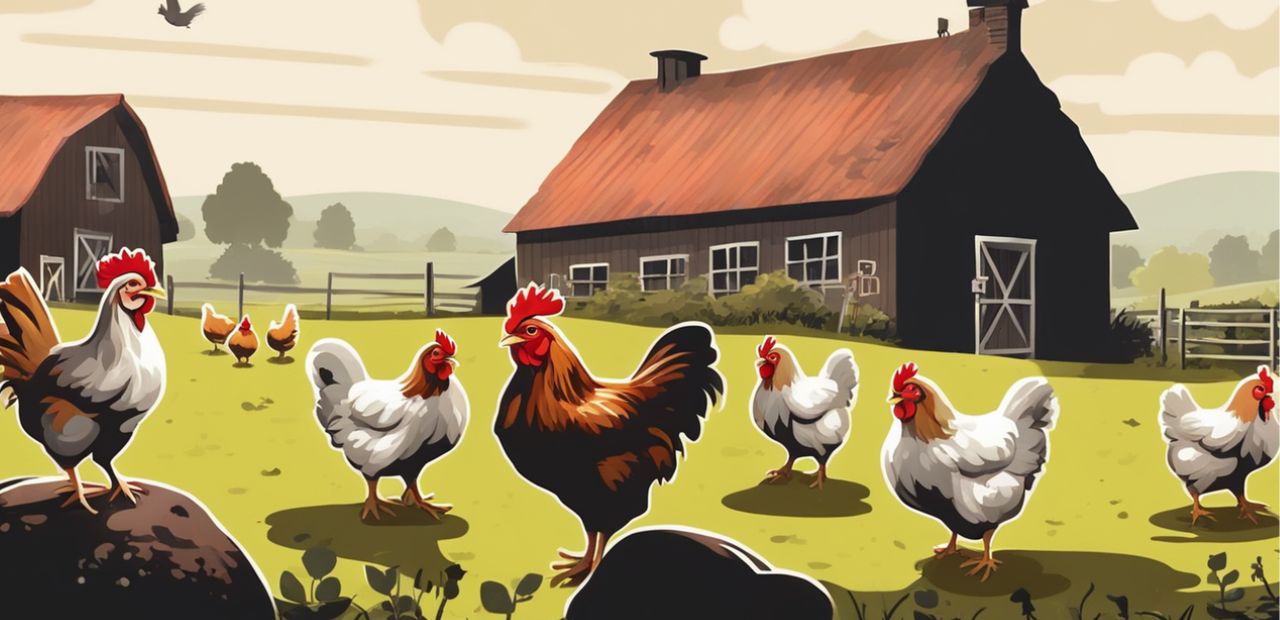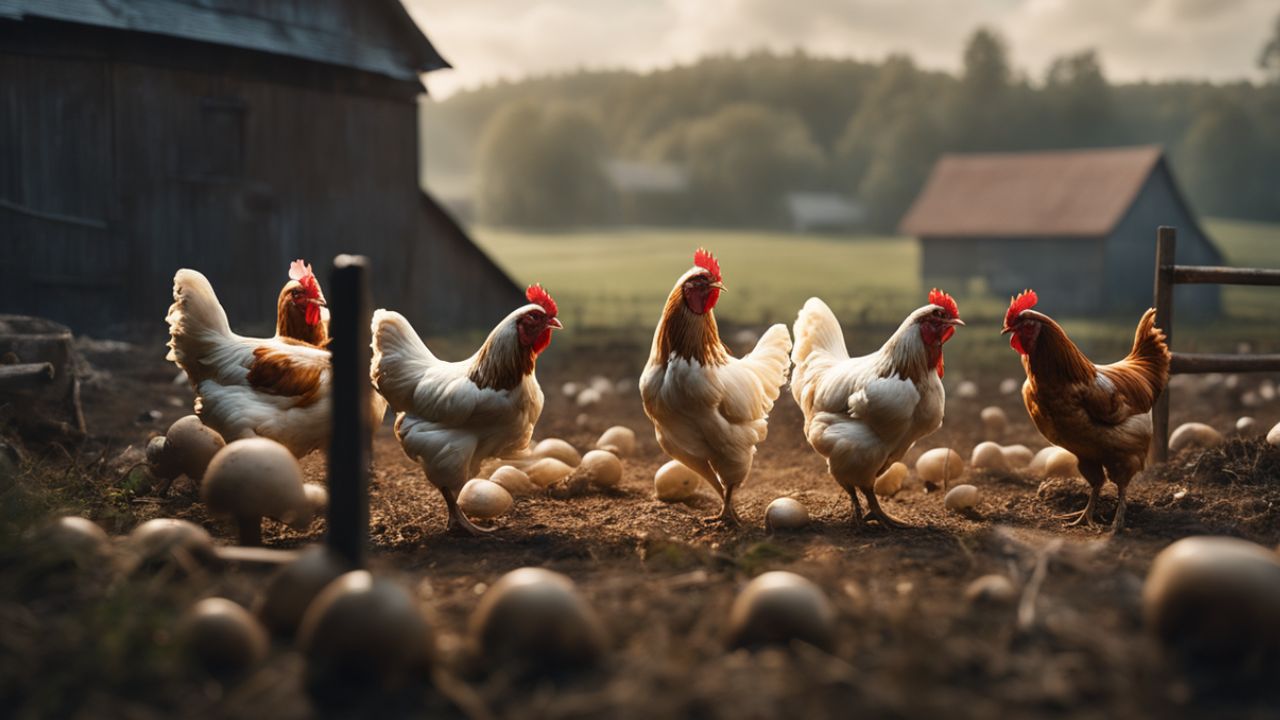Can Chickens Eat Mushrooms?
As a discerning chicken owner, you might often ponder over what treats work best for your feathered friends.
After all, ensuring optimal chicken health is no trivial matter. With so many potential snacks available, a common query that arises is: can chickens eat mushrooms?
While these fungi can be a delicious and nutritious addition to human diets, you may find yourself hesitating at your chickens’ coop door with a basketful of mushrooms, questioning, are mushrooms safe for chickens?
This compelling question demands an exploration into the safety and nutritional suitability of mushrooms for backyard poultry, taking into account that not all mushroom varieties may be appropriate for your clucking companions.
Join us as we delve into this topic to provide a clear and balanced perspective for poultry aficionados.
Contents
- 1 Understanding the Dietary Needs of Chickens
- 2 Mushroom Varieties and Chicken Safety
- 3 The Risks of Feeding Mushrooms to Chickens
- 4 How to Serve Mushrooms to Your Chickens
- 5 Can Chickens Eat Mushrooms Growing in My Yard?
- 6 Mushrooms to Avoid: Preventing Toxic Exposure
- 7 Conclusion
- 8 FAQ
- 8.1 Can chickens eat mushrooms?
- 8.2 Are mushrooms safe for chickens?
- 8.3 What are the health benefits of feeding chickens mushrooms?
- 8.4 Can chickens eat mushrooms from the grocery store?
- 8.5 Can chickens eat canned mushrooms?
- 8.6 Can chickens die from eating mushrooms?
- 8.7 What do I do if my chicken ate mushrooms that could be poisonous?
- 8.8 Raw or cooked mushrooms – what works best for chickens?
- 8.9 Can chickens eat mushroom stems?
- 8.10 What kinds of mushrooms are never safe for chickens?
- 8.11 Can chickens eat mushrooms growing in my yard?
- 8.12 Can chickens eat mushroom compost?
- 8.13 Do chickens have a natural instinct to avoid poisonous foods?
- 8.14 What are some alternative treats to mushrooms for chickens?
Key Takeaways
- Understand the do’s and don’ts of feeding mushrooms to chickens, recognizing safety is key.
- Learn about proper serving sizes and preparation methods to protect chicken health.
- Explore chickens’ natural foraging instincts, and how they apply to dietary choices including mushrooms.
- Consider the nutritional benefits as well as potential hazards before introducing mushrooms into your chickens’ diet.
- Equip yourself with knowledge to prevent toxic exposure from wild or unsuitable mushrooms.
Understanding the Dietary Needs of Chickens
As you delve into the world of backyard poultry, a fundamental aspect of ensuring chicken health is understanding their chicken dietary needs.
A chicken’s diet isn’t just about filling their bellies; it’s about meeting precise nutritional requirements that support their growth, egg production, and overall well-being.
- Proteins: Vital for growth and repair of body tissues.
- Fats: Essential for energy and absorption of vitamins.
- Vitamins: Necessary for bodily functions, including immunity and metabolism.
- Minerals: Crucial for bone health and eggshell quality.

But how do chickens know what to eat?
Interestingly, chickens’ natural instincts guide them to forage for a variety of foods that fulfill their nutritional needs.
They inherently seek out insects, seeds, and greens to create a balanced diet.
However, when considering unconventional treats like mushrooms, we need to tread carefully since not all fungi are friendly for our feathered friends.
According to PoultryDVM, “Chickens are equipped with amazing instinctual dietary selection that, if given the chance, leads them to consume a varied and balanced diet rich in the necessary nutrients.”
This instinct, paired with our knowledge from reliable sources like the Merck Veterinary Manual and insights from “Storey’s Guide to Raising Chickens” by Gail Damerow, can help us make informed decisions about what we offer to our chickens.
Let’s explore the pillars of a healthy chicken diet in the table below:
| Nutrient Category | Components | Benefits | Good Sources |
|---|---|---|---|
| Proteins | Amino acids, Enzymes | Muscle development, Feather growth | Mealworms, Seeds, Legumes |
| Fats | Essential fatty acids | Energy, Vitamin absorption | Grains, Oils, Nuts |
| Vitamins | Vitamins A, B12, D, E | Immune function, Reproduction | Leafy Greens, Dairy Products, Sunlight |
| Minerals | Calcium, Phosphorus | Bone health, Eggshell strength | Oyster Shell, Bone Meal, Crushed Eggshells |
While this table guides your foundational knowledge of chicken dietary needs, always remember that each chicken’s requirements may differ based on breed, age, and purpose, whether for egg-laying or meat.
Integrating chickens’ natural instincts into their diet by allowing them to forage can complement their feed and ensure a spectrum of essential nutrients.
Mushroom Varieties and Chicken Safety
When it comes to the health of your chickens, identifying safe mushroom species for your chickens is paramount.
While these feathered friends are known to peck at various ground treasures in their environment, it’s your responsibility to ensure their snacks are non-toxic and beneficial to their well-being.
Let’s delve into the varieties that not only pass the safety check but also offer nutritional perks.

Safe Mushroom Species for Your Chickens
Starting with the basics, the familiar and readily available button mushrooms are a safe choice for your chickens.
Similarly, the well-loved portobello mushroom – a matured version of the crimini that is known for its rich flavor and meaty texture makes for a delightful treat.
Oyster mushrooms, praised for their nutritional content and delicate texture, can also be included in your chickens’ diet without worry.
Portobello, Oyster, and Button Mushrooms
These mushroom varieties are not only safe but are packed with nutrients that can bolster the health of your flock.
Portobello mushrooms are high in selenium and potassium, while oyster mushrooms offer a valuable source of protein and fiber.
On the other hand, classic button mushrooms bring antioxidants into the mix, beneficial for the immune health of your chickens.
Specialty Mushrooms: Lion’s Mane, Shiitake, and More
For those interested in diversifying the mushroom offerings to their chickens, specialty varieties such as lion’s mane, shiitake, maitake, and reishi can be considered.
While lion’s mane is heralded for its nerve growth factors, shiitake and maitake mushrooms are esteemed for their immune-boosting properties.
Incorporating mushrooms into your chickens’ diet can lead to health benefits of feeding chickens mushrooms, such as improved immunity and potential anti-inflammatory properties.
However, it’s crucial to distinguish between wild and store-bought mushrooms.
The former may pose risks due to potential toxicity and the difficulty of accurate identification.
Opting for store-bought mushrooms serves as a safer alternative, ensuring that you’re providing non-toxic varieties to your feathered companions.
The Risks of Feeding Mushrooms to Chickens
As a backyard chicken keeper, your flock’s health is of paramount importance.
It’s essential to recognize that some mushrooms can pose a severe risk to your chickens.
While certain fungi like chicken of the woods and morel are often safe when properly identified and prepared, the concern arises when toxic mushrooms are mistakenly fed to poultry.
Understanding that chickens can die from eating mushrooms if they consume poisonous species is crucial.
Poisonous mushroom species such as Amanita and several others contain compounds that can be lethal to chickens.
The difficulty with mushrooms is that toxic varieties often resemble non-toxic ones, making it incredibly risky to allow your chickens to consume wild mushrooms.
The consequences of eating toxic mushrooms can range from liver failure to neurological disorders, and ultimately, death.
Here are symptoms to watch for if you suspect your chicken has eaten a poisonous mushroom:
- Lethargy or decreased activity
- Loss of appetite or refusal to drink water
- Ruffled feathers and a hunched posture
- Diarrhea or vomiting
- Seizures or neurological signs such as tremors
If you observe any of these signs, contact a veterinarian immediately for advice.
Quick action can make the difference in preventing fatalities in your flock.
As a proactive step, familiarize yourself with poisonous mushroom species in your area and take measures to prevent your chickens from encountering them.
Also, be cautious when adding mushrooms to their diet, ensuring you’re using only varieties known to be safe for poultry.
Your vigilance can help safeguard your chickens against these hidden dangers.
How to Serve Mushrooms to Your Chickens
Integrating mushrooms into your chickens’ diet can be a nutritious addition, but it’s essential to know the dos and don’ts.
Let’s dive into the best ways to prepare mushrooms for your flock, ensuring their safety and health are top priorities.
Raw or Cooked Mushrooms – What Works Best?
When it comes to serving mushrooms to your chickens, both raw and cooked mushrooms are generally safe, provided they are the right type.
Chickens can easily digest soft, cooked mushrooms, and cooking can help to kill any potential bacteria.
However, if you opt for raw, ensure they’re thoroughly washed. Remember, never feed your chickens wild mushrooms due to the risk of toxicity.
Preparing Store-Bought Mushrooms for Your Flock
Wondering if can chickens eat mushrooms from the grocery store?
The answer is yes!
Store-bought varieties such as button, portobello, and oyster are suitable for your chickens.
Prior to serving, clean the mushrooms thoroughly to remove any residual pesticides or contaminants. As for mushroom stems, they can be included too, but chop them into small, manageable pieces to prevent choking.
While fresh is preferable, you might ask, can chickens eat canned mushrooms?
In moderation, canned mushrooms can be an option, but they should be rinsed to lower the sodium content which isn’t healthy for your flock.
The Importance of Serving Size and Frequency
Moderation is key when feeding mushrooms to your chickens.
They should only be a small part of a well-balanced diet.
Overfeeding could lead to nutritional imbalances or even digestive issues.
As a treat, mushrooms should constitute no more than 10% of your chickens’ overall diet, and should be given only once or twice a week.
If utilizing mushroom compost, ensure it’s fully composted and free from any mold or decomposing pieces, so it doesn’t harm your chickens.
Can Chickens Eat Mushrooms Growing in My Yard?
As a backyard chicken keeper, you might wonder, can chickens eat mushrooms growing in my yard? It’s great you’re asking because the safety of your flock is paramount.
While chickens do possess a chicken’s natural instinct to avoid poisonous foods, some toxic mushrooms can still pose a risk if ingested.
Being able to identify which fungi are friend and which are foe is crucial for any poultry enthusiast.
Let’s delve into the porchini of the mushroom world – the crimini – to ensure your chickens can peck in peace.
- Inspect Regularly: Take walks through your yard post-rainfall when mushrooms are likely to sprout. Knowing what’s popping up is the first step in protection.
- Crimini Mushrooms: These are generally safe and could be a nutritious snack for your flock. However, ascertain their identity with certainty as they bear resemblance to some harmful varieties.
- Consult an Expert: If you’re unsure about a mushroom species, seek advice from a mycologist (mushroom expert) before allowing your chickens to consume them.
Not all mushrooms are off the table, and your chickens might enjoy an occasional crimini, which is safe for human consumption as well.
However, the ones growing wild in your yard demand a closer look. Here’s a handy table to help you identify common yard mushrooms:
| Mushroom Type | Edible | Description | Chicken-Safe |
|---|---|---|---|
| Crimini | Yes | Small, brown, with a white stem | Yes, if verified |
| Amanita | No | White or brightly colored with a cap | Absolute No! |
| Chanterelle | Yes | Yellow to orange, funnel-shaped | Yes, with caution |
| Toadstool | No | Various, often umbrella-shaped with dots | No |
Keep in mind that a chicken’s natural instinct is not foolproof, and they may sometimes peck at things they shouldn’t.
Regular monitoring and removing suspicious mushrooms can save your chickens from exposure to toxic ones.
When in doubt, err on the side of caution and prevent your chickens from ingesting wild mushrooms.
After all, their health and well-being are what matters most in your journey of backyard poultry keeping.
Mushrooms to Avoid: Preventing Toxic Exposure
As you delight in observing your chickens scratch and peck in their natural habitat, safety is always a priority.
One important aspect involves being vigilant about what your feathered friends pick with their beaks, sometimes out of sheer curiosity.
Not every gift of nature is a healthy treat, especially when it comes to certain mushroom species to never feed chickens.
While your flock may have the chickens’ natural instinct to avoid poisonous foods, they might not always distinguish the good from the harmful, and therefore, it’s crucial to preemptively eliminate certain mushrooms from their environment.
Mushroom Species to Never Feed Chickens
While a variety of fungi could add nutrients to those omnivorous cluckers’ diet, several mushroom varieties have toxic properties that can pose significant health risks.
These include, but are not limited to, Amanita phalloides (death cap), Gyromitra esculenta (false morel), and Amanita ocreata (destroying angel).
These species, among others, contain compounds that can cause severe liver and neurological damage potentially leading to death if ingested by your chickens.
For this reason, it’s imperative to clear your chicken coop’s surroundings from these dangerous mushrooms.
Recognizing Chickens’ Natural Instinct to Avoid Poisonous Foods
Chickens have survived for centuries due to their innate ability to avoid certain dangerous foods.
Just like their wild bird counterparts, they often steer clear of brightly colored or unusual-smelling potential edibles, which include toxic mushrooms.
However, reliance on instinct alone is not a foolproof method to prevent accidental consumption of toxic substances.
It’s your responsibility to ensure that their foraging grounds are free from these hazards.
Removing perilous fungi from their free-ranging areas can protect your flock, but for added safety and to satisfy their peckish pursuits, introduce chickens’ alternative treats to mushrooms that are healthy and safe.
Fresh fruits, vegetables, grains, and protein-rich worms or grubs can supplement their diet delightfully while maintaining nutritional balance.
These treats not only serve as a substitute for mushrooms but also represent a step towards ensuring optimal health and vitality for your cherished chickens.
Conclusion
Throughout this article, we’ve delved into the intricate relationship between mushrooms and a chicken’s diet, uncovering that indeed, mushrooms can be a suitable addition to your flock’s menu when chosen with precision.
The focus has been on selecting non-toxic varieties and ensuring that mushrooms, whether they are the stems or other parts, are prepared in a way that secures the wellbeing of your chickens.
Summarizing Mushrooms and a Chicken’s Diet
As we’ve explored, certain mushrooms like portobello, oyster, and button are generally considered safe for chickens.
However, you must exercise caution and avoid wild or unknown species that could pose serious health risks.
The role of mushrooms in a chicken’s diet should be as a supplementary treat rather than a staple, as their primary nutrition should come from a well-rounded, balanced diet specifically formulated for poultry.
Alternative Treats and Dietary Supplements
On the note of dietary diversity, it’s beneficial to incorporate a variety of treats and dietary supplements to ensure your chickens receive all necessary nutrients.
Options abound in the form of greens, fruits, grains, and commercially available supplements that cater to a chicken’s nutritional needs.
By offering a medley of options and keeping mushrooms as an occasional treat, you can foster the health and happiness of your feathered friends while enjoying the peace of mind that comes from knowing you’re providing safe and nutritious food choices.
FAQ
Can chickens eat mushrooms?
Chickens can eat certain types of mushrooms, but it’s important to be cautious because not all mushrooms are safe.
Store-bought mushrooms, such as portobello, oyster, button, and other cultivated varieties are typically safe.
However, it’s critical to avoid wild mushrooms or those not specifically identified as non-toxic, as they could potentially be harmful or even fatal to your birds.
Are mushrooms safe for chickens?
Yes, some mushroom species are safe for chickens.
The commonly consumed varieties like portobello, oyster, and button mushrooms that you find at the grocery store are safe when fed in moderation.
It is essential to ensure mushrooms are clean and free from contaminants before offering them to your flock.
What are the health benefits of feeding chickens mushrooms?
Mushrooms can be a source of protein, vitamins B and D, minerals, and antioxidants for chickens.
These nutrients can support chicken health in various ways, including enhancing their immune system and contributing to overall well-being.
Can chickens eat mushrooms from the grocery store?
Yes, chickens can eat mushrooms from the grocery store.
These are a safe choice as they have been grown in controlled environments and are free from toxins that wild mushrooms might contain.
It’s still recommended to wash them and offer in small, manageable amounts.
Can chickens eat canned mushrooms?
It’s best to avoid feeding canned mushrooms to chickens regularly, as they often contain added salt and preservatives that aren’t ideal for their health.
However, in small quantities and as an occasional treat, they should be safe if you rinse them well to remove excess sodium.
Can chickens die from eating mushrooms?
Unfortunately, yes, chickens can die from consuming toxic wild mushrooms.
It’s vital to keep chickens away from areas where poisonous mushrooms may grow and only provide them with varieties known to be safe.
What do I do if my chicken ate mushrooms that could be poisonous?
If you suspect your chicken has eaten a potentially poisonous mushroom, contact a veterinarian immediately.
Provide as much detail as possible about the mushroom consumed, and follow the vet’s instructions carefully.
Raw or cooked mushrooms – what works best for chickens?
Both raw and cooked mushrooms are generally safe for chickens as long as they are from safe species.
Cooking may make them easier to digest and can kill any potential pathogens, but it’s best to avoid using oils or seasonings if you choose to cook the mushrooms for your birds.
Can chickens eat mushroom stems?
Yes, chickens can eat mushroom stems from safe mushroom species.
Just like the caps, stems should be clean and free from any dirt or debris before you feed them to your chickens.
What kinds of mushrooms are never safe for chickens?
Avoid giving your chickens wild mushrooms or varieties known to be toxic to humans, such as Amanita species.
Always err on the side of caution, as many mushrooms can be harmful and even lethal to chickens.
Can chickens eat mushrooms growing in my yard?
Unless you are well-versed in mycology and can positively identify safe mushrooms, it’s best not to let your chickens eat mushrooms that are growing in your yard.
Many wild mushrooms can be toxic, and the risk is not worth taking.
Can chickens eat mushroom compost?
Mushroom compost can be used in the garden and around plants, but chickens should not eat it directly.
While the compost itself is not hazardous, it may contain residual parts of mushrooms that could be toxic if ingested.
Do chickens have a natural instinct to avoid poisonous foods?
Chickens have some instinct to avoid certain harmful foods, but this isn’t foolproof.
It’s still possible for them to ingest toxic substances out of curiosity or if their foraging options are limited.
Thus, it’s essential to monitor their environment to prevent exposure to poisonous mushrooms and other harmful items.
What are some alternative treats to mushrooms for chickens?
There are plenty of safe and healthy alternatives to mushrooms for chickens, such as fruits, vegetables, grains, and insects.
Some popular treats include watermelon, cooked pumpkin, mealworms, and cooked grains like rice or pasta.

